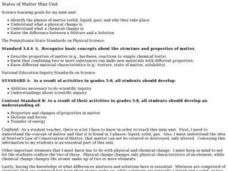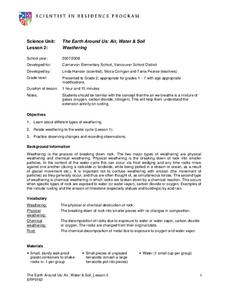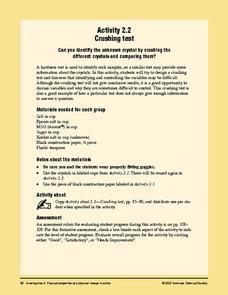Curated OER
States of Matter Mini-Unit
Students identify he phases of matter (solid, liquid, gas), and why they take place. They comprehend what a physical change is and what a chemical change is. Students know the difference between a Mixture and a Solution.
Curated OER
Differentiate Elements, Compounds, and Mixtures
Students examine the differences between elements, compounds and mixtures. Using diagrams, they compare and contrast atoms and molecules and describe various chemical reactions. They distinguish the differences between ionic and...
Curated OER
Periodic Trends
High schoolers review how physical and chemical change while discussing the properties. They diagram the electron dot for the first four elements in the periodic table. Students identify elements and state what they know while...
Curated OER
Build a Better Bouncer
Students experiment with silly putty. In this chemical changes lesson students work in groups, perform tests and collect data.
Curated OER
Forest Floor Terrarium
Students study the aspects of a forest floor ecosystem, including decomposition, the water cycle, food webs, the needs of living things, and physical vs. chemical change over an extended period. In addition, students conduct observations...
Curated OER
Vinegar Experiment
Fifth graders mix vinegar with different substances and explore the reaction. They record data from the experiment. Students examine chemical change, reaction, physical change and physical reaction.
Curated OER
Science:Effects of Weathering
Seventh graders take an outdoor observation walk around the campus and take soil samples. Working in groups , they conduct experiments with rocks and soil that demonstrate the effects of different types of erosion.
Curated OER
Weathering
Second graders explore weathering and how the water cycle plays a part in weathering. In this weathering lesson, 2nd graders put gravel and sugar cubes in a jar and shake, simulating weathering. Students use the scientific method to do...
Curated OER
The Energy Debate - Energy of Peanut
Learners articulate the difference between the terms heat and temperature. They calculate the amount of energy associated with a given temperature rise and design an experiment to measure the energy of a fuel.
Curated OER
Physical Science: Magnetism and Electricity
Students use a variety of objects to test for ability to "stick" to a magnet. They perform an experiment to see that electricity in circuits can produce light, heat, sound, and magnetic effects. They discover magnets attract and repel...
Curated OER
Elements of Chemistry: Compounds And Reactions
Learners identify substances and discover common substances and their chemical composition. In this chemistry lesson students write a description of the substances and how they are used.
Curated OER
Resources - A Reading Guide
In this resources worksheet, students compare and contrast physical and chemical properties and changes. Students review the periodic table, pattern of atomic numbers and chemical reactivity. This worksheet has 56 short answer questions.
Curated OER
Where's the Evidence?
Eighth graders observe evidence of chemical reactions. In this chemical reactions lesson students study chemical processes and complete a lab activity.
Curated OER
Outcomes Science 4: Earth & Beyond
In this earth and beyond science worksheet, students read through 11 pages of information on weather, global warming, climate change and other related topics. There are many website links on the pages that provide additional information...
Royal Society of Chemistry
Equilibria—Gifted and Talented Chemistry
Teaching is a balancing act! Keep things on an even keel with a comprehensive equilibrium lesson plan. The resource covers reversible and irreversible reactions, Le Chatelier's Principle, and the industrial applications of equilibrium...
Curated OER
Stream Scanners
Young scholars investigate quality of water in a stream, lake, or pond by examining chemical, physical, and biological characteristics.
Curated OER
Puberty
Introduce the topic of puberty. This presentation breaks it down into bite-sized pieces: physical changes, mental changes, emotional changes, and social changes. There is some basic information in each section, which hopefully opens it...
Curated OER
That's Predictable - Stream Side Science
Research the impact that changes in biotic or abiotic factors might have on an ecosystem. Debate for or against the changes and take action in the community. This resource ideally follows stream studies that young ecologists may have...
Curated OER
Weathering and Soil Formation
A set of 27 slides systematically shows how weathering, erosion, and deposition contribute to soil formation. Both chemical and mechanical weathering are described, as are resulting soil layers and properties. There is no longer any need...
Chicago Botanic Garden
Carbon, Greenhouse Gases, and Climate
Climate models mathematically represent the interactions of the atmosphere, oceans, land, sun, surface, and ice. Part two in the series of four lessons looks at the role greenhouse gases play in keeping Earth warm and has participants...
Cornell University
Thin Films
Combine mathematics and science to calculate measurements of unmeasurable materials. Individuals use knowledge of density and volume to determine the thickness of the film used in production. They also apply stoichiometry to determine...
Curated OER
Towers of the Lost City
Middle school marine scientists compare the pH change in distilled and saltwater as acetic acid is added one drop at a time. Then they compare the pH change in both when sodium hydroxide is added. This experiment demonstrates the...
American Chemical Society
Crushing Test
Solidify understanding of the properties of crystals by crushing them to compare hardness. After some class discussion, a procedure is planned, and then small groups go about making observations as they crush five different crystal...
NOAA
Please Pass the Salt
Salinity is the focus of two experimenters that work to answer the question, How does salt change the physical properties of water? Super scientists compare the freezing rate of salt and fresh water, combine the two waters to observe how...

























